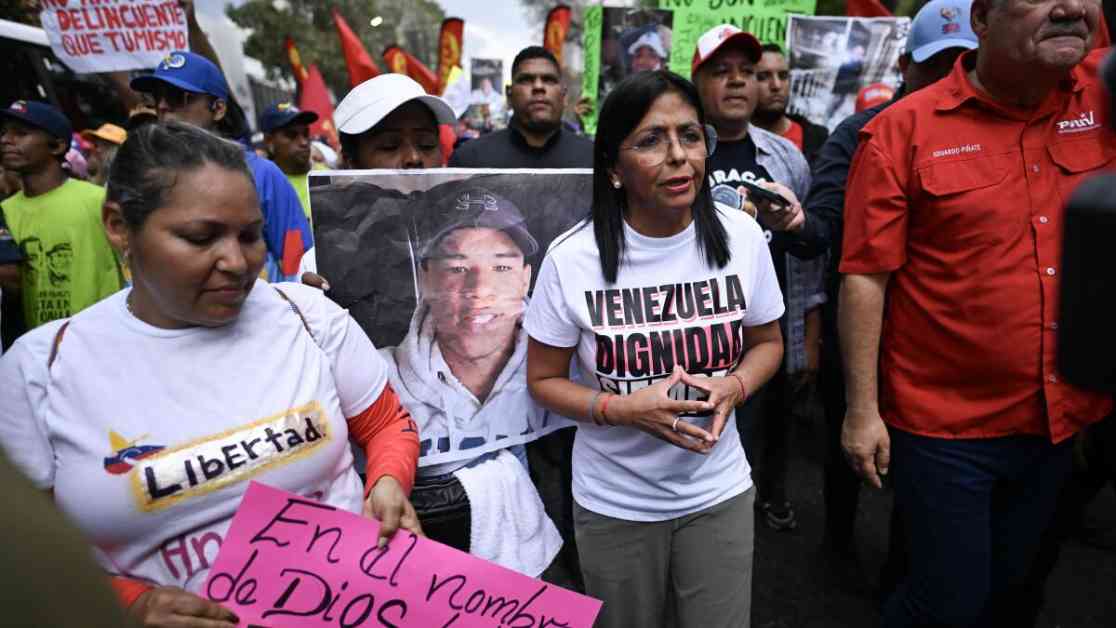In a recent turn of events, the deportation of innocent individuals with tattoos has sparked outrage and concern among families affected by the harsh consequences of misguided policies. Two Venezuelans, one a former professional soccer player and the other a social media influencer, found themselves caught in the crosshairs of a flawed immigration system that led to their detention and subsequent deportation to El Salvador. Despite their legal entry into the United States, both men were swiftly removed from the country and now languish in Salvadoran prisons, prompting their loved ones to decry the injustice and cruelty of their plight.
Jerce Egbunik Reyes Barrios, the ex-footballer, and Nolberto Rafael Aguilar Rodríguez, the influencer, were among the 261 individuals, mostly from Venezuela, who were expelled to El Salvador. The Trump administration justified this mass deportation by linking the deportees to the Venezuelan gang Tren de Aragua, a claim that has been widely disputed by legal experts and human rights advocates. The evidence used to support these allegations often hinges on tattoos and social media posts, highlighting the dubious nature of the accusations leveled against these individuals.
The case of Reyes Barrios, in particular, sheds light on the human cost of flawed immigration policies. Upon presenting himself for a routine appointment under the Biden administration’s CBP One program, Reyes Barrios was wrongfully accused of gang affiliation based on a tattoo and a social media post that authorities misinterpreted as gang-related. His lawyer, Linette Tobin, emphasized that the tattoo and gesture in question were innocent expressions of personal beliefs and interests, rather than symbols of criminal activity.
Reyes Barrios’s harrowing journey from Venezuela to the United States, marked by political persecution and torture, underscores the complexities and challenges faced by asylum seekers seeking refuge in a country that prides itself on democratic values and human rights. Despite his clean record and legitimate asylum claims, Reyes Barrios was summarily deported to El Salvador, where he now awaits an uncertain fate in a foreign land far from his family and loved ones.
The impact of these deportations extends beyond the individuals directly affected, reverberating throughout their communities and families. Mariyen Araujo Sandoval, Reyes Barrios’s wife, remains in Mexico with their children, grappling with the uncertainty of her husband’s situation and the dashed hopes of a better life in the United States. The fear and anxiety experienced by families separated by unjust policies underscore the human toll of immigration enforcement practices that prioritize punitive measures over compassion and fairness.
As legal challenges mount and public outcry grows, the fate of innocent individuals caught in the crossfire of political maneuvers remains uncertain. The erosion of democratic norms and the disregard for due process rights in El Salvador highlight the broader implications of the Trump administration’s aggressive stance on immigration and its impact on vulnerable populations seeking safety and security.
Amidst the chaos and confusion surrounding these deportations, the stories of Reyes Barrios and Aguilar Rodríguez serve as poignant reminders of the human faces behind the headlines and policy debates. Their experiences shed light on the complexities and challenges faced by migrants and asylum seekers in a world where borders and bureaucracies often overshadow basic human rights and dignity.
As these individuals navigate a hostile and unforgiving system, their resilience and courage stand as testaments to the enduring spirit of those who seek a better future for themselves and their families. The quest for justice and fairness in the face of adversity continues, fueled by the unwavering belief in the inherent worth and dignity of every individual, regardless of their circumstances or background.














